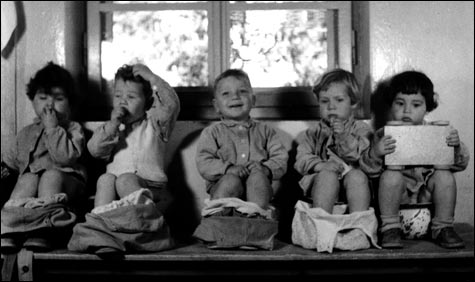
CHILDREN OF THE SUN: Ran Tal’s film is a personal oral history of the kibbutz, using only found footage and home movies. |
| Jewishfilm.2008 | Brandeis University + Harvard Film Archive + Institute of Contemporary Art: March 29–April 13 |
Virtually every major city in this country hosts at least one “Jewish Film Festival” each year (even Baton Rouge and Dayton), and if it seems there’s a paucity of worthwhile movies to fill up all those dockets, it’s still moving to view the phenomenon as a cultural sounding, as dispatches from an anxious frontier. The implicit effort to form some cohesive idea of “Jewish cinema” is doomed to struggle, because it confronts the same essence of 20th-century history that diasporized the race all over again. “Jewish cinema” is largely a cinema about living on the fringes of everywhere, and knowing the flux of human life across national lines better than the nations themselves.If only this translated into better films. The one significant fiction feature in the Brandeis-centered Jewishfilm.2008 appears to be Ilya Motyleff & Sidney Goldin’s THE CANTOR’S SON (1937; Brandeis: March 30 at 4:15 pm), a grittier, more thoroughly musical, New York–shot revision of The Jazz Singer’s narrative template that may be the most exhilarating example yet exhumed of the once-thriving, completely global Yiddish cinema, which was made in the “ghetto tongue” and therefore was screenable in any city with Jews, from San Francisco to Warsaw. Robert Thalheim’s AM ENDE KOMMEN TOURISTEN|AND ALONG COME TOURISTS (2007; HFA: April 4 at 7 pm; Brandeis: April 6 at 7 pm) is an enervating and, finally, tasteless fizzle about a preposterously hunky German lad (Alexander Fehling) whose civil-service stint requires him to work at Auschwitz. There, no surprise, he develops a testy relationship with a camp-survivor codger (who of course learns to respect the naive kid) and a moony romance with a cute camp-tour guide. Whatever temptation there might have been to semi-satirize the present state of Holocaust tourist culture (à la Rex Bloomstein’s doc Kz) is abandoned early, in favor of a dull kind of tongue-tied sensitivity and an ardor for Fehling’s brooding profile.
Ayelet Menahemi’s NOODLE (2007; Brandeis: March 29 at 8 pm + April 13 at 7 pm), an Israeli sniffler, opts for schmaltzy melodrama and unlikely coincidences, as a lonely but lovely Tel Aviv widow (Mili Avital) gets stuck with the six-year-old son of her just-deported cleaning woman. You know where it’s headed: maternal aches, cute inter-cultural exchanges, outrageous heroism, big tears (and on top of that, irrelevant scads of sibling bickering and worrying about the heroine’s sister’s marriage).
As always, the documentaries rule — it may be that, given the legacy of Jewish life during the short history of movies, non-fiction is the culture’s most eloquent form. Nadav Schirman’s THE CHAMPAGNE SPY (2007; ICA: April 5 at 7 pm; Brandeis: April 13 at 4:15 pm) recounts the life of Wolfgang Lotz, the Mossad agent who lived a double life as an ex-Nazi playboy in Egypt, and who, as he upset Nasser’s nuclear program and arranged mail bombs, also began to prefer his decadent cover to his “real” life and even married his German lover while his Israeli wife waited in Paris. It’s a great, cautionary espionage tale, if told in Schirman’s film with far too much self-involved spy-movie flash and overripe mood, pretentiously posing Lotz’s grown son as the wandering, trenchcoated protagonist of his own investigative “thriller.”
 Topics
Topics:
Features
, Entertainment, Science and Technology, Movies, More  , Entertainment, Science and Technology, Movies, The Holocaust, Social and Behavioral Sciences, Institute of Contemporary Art, United Nations, Brandeis University, Alexander Fehling, Mili Avital, Less
, Entertainment, Science and Technology, Movies, The Holocaust, Social and Behavioral Sciences, Institute of Contemporary Art, United Nations, Brandeis University, Alexander Fehling, Mili Avital, Less 